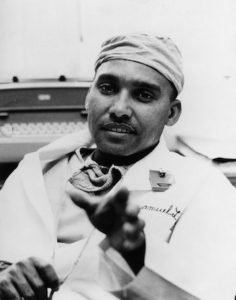
Samuel L. Kountz
*Samuel Kountz was born on this date in 1930. He was a Black doctor and kidney specialist.
From Lexa, Ark., the son of a Baptist minister, young Kountz decided to become a doctor at the age of eight. He failed the entrance exam at Arkansas AM&N College and then appealed to the college president, who gave him another chance. Kountz subsequently earned A's and B's.
He received a Bachelor of Science from Arkansas Mechanical and Normal College, now the University of Arkansas at Pine Bluff in 1952. He got his master's in Biochemistry at the University of Arkansas, Fayetteville. He was one of the first Blacks admitted to its medical school (the University of Arkansas for Medical Sciences, Little Rock, in 1958). Following graduation, he served as an intern at San Francisco County Hospital.
Dr. Samuel Lee Kountz participated in the first West Coast kidney transplant in 1959. Before the development of Kountz's technique of detecting and treating rejection of transplanted kidneys, less than five percent of the transplant patients survived for more than two years. Developing the technique took three years of experimentation with dogs in London and the United States. While in London on a surgery fellowship, Dr. Kountz discovered that committed cells of the host attacked and destroyed the small blood vessels of the transplanted kidney, thus causing the kidney to die from lack of blood-supplied oxygen.
The technique he and his associates at Stanford Medical School developed permits doctors to watch the fall of the kidney blood supply following surgery and to administer specific amounts of drugs to the patient at carefully timed intervals to overcome the rejection process. In 1964, he received the Outstanding Investigator Award, a prize of $1,000 from the American College of Cardiology. Kountz was an Associate Professor of Surgery at Stanford University from 1965 to 1967. From 1967 to 1970, Dr. Kountz served as an Associate Professor at the University of California.
He was appointed Professor of Surgery and Chairman of the Department at the State University of New York (SUNY), Downstate Medical Center in Brooklyn, New York, beginning in 1972 and Surgeon-in-Chief of Kings County Hospital. The University of Arkansas awarded him the honorary Juris Doctor in 1973. He developed the country's largest kidney transplant research and training program at the University of California, San Francisco. Despite his success in human transplants, Dr. Kountz believes the chief source of healthy parts to replace malfunctioning ones will be primates because there are many problems in obtaining and matching human donors.
Kountz’s many memberships and awards include Diplomat, American Board of Surgeons (1966). The Institute of Medicine of the National Academy of Science, Fellow, American College of Surgeons, and Fullbright Professor of University of Arkansas, Rockville (1965-1966). Outstanding Investigator Award ($1,000), American College of Cardiology, Honorary Juris Doctor, University of Arkansas (1973), and President, Society of University Surgeons (1974).
Samuel Kountz was the author or co-author of 172 articles in scientific publications. He died on February 23, 1981.
Negro Almanac:
A Reference Work of the Afro American, 4th ed.
Harry A. Ploski and James Williams, eds.
New York, NY: Wiley, 1983. p. 1059.